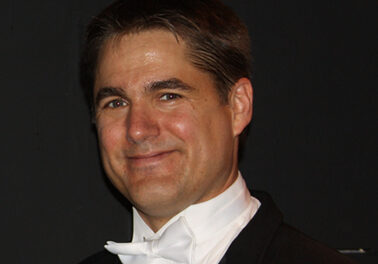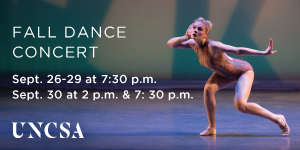When Imani Winds came to Raleigh over a decade ago, the ensemble had already been in business for ten years. As Joseph Robinson, former principal oboe of the NY Philharmonic, recently said, Imani has become the world’s leading woodwind quintet. Without question.
Likewise, it’s been a decade since the Harlem Quartet‘s first appearance in NC, at which point the ensemble was already totally mature.
Both have been back frequently, and both have more gigs coming up. Many more. Indeed, as it wraps up a week in Durham, Imani is beginning a two-year residency for Duke Performances – they’ll be back again for another week next March.* And the Harlem Quartet returns in May for a concert in Raleigh. (They’re meanwhile in residence in London for three years!) Good. All good.
But the immediate news is that these two estimable ensembles appeared together on a cold, dark night in Baldwin Auditorium, under DP’s auspices. On the program was a single work, the stunning, eight-part, full-evening composition** by Jeff Scott (b.1967), hornist of Imani, that he calls Passion for Bach and Coltrane (2014). (And don’t overlook all his other original works!)
The featured work involved his own ensemble plus the Harlem Quartet plus a distinguished piano jazz trio plus narration and poems by NC native A.B. Spellman – who happens to be the father of Imani’s oboist (who, to close the circle, was a Joe Robinson student…). ‘Twas a veritable baker’s dozen of world-class artists and artistry. ‘Twas – in a word – fabulous.
The piece itself, Scott relates, was inspired by Spellman’s Things I Must Have Known. “The poetry,” he writes, “speaks to the musical mastery of … Bach, … Coltrane, and Gonzalo Rubalcaba….” The composition reimagines the work of all three, encompassing music from the Goldberg Variations, S.988 (“Keyboard exercise, consisting of an ARIA with diverse variations for harpsichord with two manuals”), from Coltrane, with special emphasis on A Love Supreme,*** and, in the penultimate movement, an extended tribute to the great Cuban pianist, with a concluding homage to Coltrane’s best-known, most admired recording. Three of the eight movements are completely original.
As Scott explains, “Passion explores the influence of spirituality on the art of these masters and asks the inevitable question, what if JS Bach and John Coltrane might chance to meet?”
And there’s a good bit of passion music in it, too, because Spellman retells significant portions of Old Bach’s Gospel-inspired passion stories as preserved in the two surviving oratorios bearing that title (St. John and St. Matthew).
In many respects, Coltrane is the most classical of the jazz greats (with the possible exception of Jacques Loussier, whose work centered on Bach). And Bach is the classical dude (well, Baroque, to be specific) whose music, more than anyone else’s, lends itself to treatment in jazz idioms. The pairing is therefore totally logical. And brilliant, as Scott has composed it. And breathtaking, as played at Duke on this occasion. (Readers may see and hear it with many of the same artists in a video from Houston from 2016 available here.)
And of course it was brilliant and totally engaging and captivating, given the stellar capabilities of these artists – and given their totally down-to-earth humanity. Spellman reading his own words was worth the price of admission, but then we got Imani – flutist Brandon Patrick George, oboist Toyin Spellman-Diaz, hornist/composer Scott, clarinetist Mark Dover, and bassoonist Monica Ellis (who shared occasional conducting duties with Scott) – and Harlem – violinists Ilmar Gavilán and Melissa White, violist Jaime Amador, and cellist Felix Umansky – and that great piano jazz ensemble – keyboardist Alex Brown, bassist Edward Perez, and drummer Neal Smith. And did we mention Spellman, the poet, our modern-day Langston Hughes (who coincidentally spent 30 years (!) at the National Endowment for the Arts, serving others?!). Everyone had lots to do, and there were many solo bits for all the players, including the clarinetist, the flutist, the chief fiddler and his stand partner, the violist, the cellist, the bassoonist, that luscious oboe, the pianist, the magical bassist, the propulsive drummer, Great Scott… – well, you get the picture.
Bach figured prominently in the opener and the start of what was basically the second half and kept reappearing. Coltrane figured prominently in the finale, but his presence was likewise ubiquitous. And the glue was Scott’s brilliance. Good company from start to finish.
Gunther Schuller called it “third-stream music,” this merging of the classics and jazz, but Scott’s done him one better. Several times more than one.
So if you weren’t there, some self-flagellation is definitely in order. And if you were, you don’t need me to tell you that you’re almost certainly still floating on a high-set artistic cloud.
There was a good turnout, but that the place wasn’t SRO some found perplexing. One thought of the old refrain, “If the public won’t come, you can’t make them” – shades of Gatti-Casazza or maybe Sol Hurok. To be sure, when these folks, as individual artists, in their respective ensembles, or together, in various or sundry combos, appear hereabouts again, the place ought to be chock-a-block! ‘Nuff said.
*The ensemble had turned out for this residency for a Nov. 14 concert with the Duke Wind Symphony, in which they soloed in Scott’s “¡Baile Se Quiere!” (Dance if you want to). It was great, too.
**Lasting as heard in Durham about an hour and twenty minutes…. The movement titles are as follow: 1. Aria; 2. Psalm; 3. Resolution; 4. Out of Nazareth; 5. Variation 13; 6. Groovin’ Low; 7. A Hug for Gonzalo; & 8. Acknowledgment (A Love Supreme)
***This wasn’t the first time classical folk took on Coltrane in the Triangle – the Turtle Islanders did A Love Supreme in 2012.












